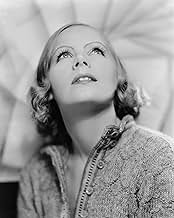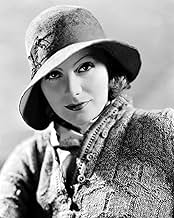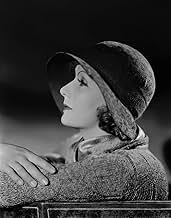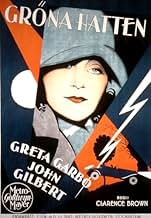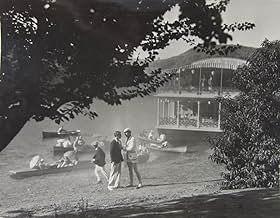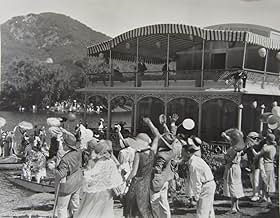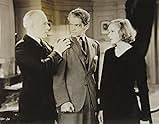VALUTAZIONE IMDb
7,1/10
1821
LA TUA VALUTAZIONE
Aggiungi una trama nella tua linguaWhen two childhood sweethearts are kept from marrying, misery ensues.When two childhood sweethearts are kept from marrying, misery ensues.When two childhood sweethearts are kept from marrying, misery ensues.
- Regia
- Sceneggiatura
- Star
- Candidato a 1 Oscar
- 2 vittorie e 1 candidatura in totale
Johnny Mack Brown
- David Furness
- (as John Mack Brown)
Gertrude Astor
- Party Guest
- (non citato nei titoli originali)
Agostino Borgato
- French Police Inspector
- (non citato nei titoli originali)
F.F. Guenste
- Servant at Davids Death Investigation
- (non citato nei titoli originali)
Sydney Jarvis
- Gendarme
- (non citato nei titoli originali)
Fred Kelsey
- Detective
- (non citato nei titoli originali)
Anita Louise
- Diana - as a Child
- (non citato nei titoli originali)
Alphonse Martell
- French Hotel Concierge
- (non citato nei titoli originali)
William H. O'Brien
- Man Peering Into Room
- (non citato nei titoli originali)
Frank Finch Smiles
- Butler
- (non citato nei titoli originali)
Recensioni in evidenza
Greta garbo's career spanned the 1920s (silents) and 1930s (talkies). This one came about halfway through, just before the switch to talkies. And because it's a silent, you are forced to really pay attention. Featuring garbo and gilbert, the huge stars of the day. Co-stars a couple more big names.. doug fairbanks and lewis stone. Diana and neville want to be married, but his father wants to prevent it from happening. High drama, in spite of the fact that it's been toned way down from the original story. This started life as a novel, then a play, and later this film! According to the trivia section, because the original story had so many taboo elements, it was all changed around to get past the censors. Interesting, since so many of the production code rules didn't really get enforced until the early 1930s. It's a good film, in spite of all the changes. It was even nominated for best writing. And that's an accomplishment, since the story had been so altered. Directed by clarence brown. And pretty amazing picture quality, since this is coming up on 100 years old. Must have been a good restoration. Never miss a greta garbo film!
'A Woman of Affairs' had a good deal going for it. It starred the always magical Greta Garbo. It had John Gilbert as her leading man, they always worked beautifully together in the four films they did together (starting with 'Flesh and the Devil' and finishing with 'Queen Christina') and Gilbert. It had Clarence Brown as director, he was not a consistent director as such but he was a sympathetic one with the right material. It had Douglas Fairbanks Jr in a more dramatic role. And it had Lewis Stone, another Garbo regular.
While not a great film as such, 'A Woman of Affairs' is a must for fans of Garbo who gives one of her best silent film performances. This is also a good representation of how well she and Gilbert worked together, and one of her better films with Brown as director. It is not a film for anybody who likes their stories realistic and more subtle, but for beautiful filming, emotional impact and good acting, 'A Woman of Affairs' is definitely worth seeing.
Is it perfect? No, and the story is the weak link. Not in a dull way, but it does get very melodramatic in the latter stages of the film and some parts are not just silly but sense and credulity go out of the window at times. Just didn't buy how some events happen as fast as they do here. The ending is both rushed and contrived.
Part of me did wish too that Gilbert's role was better developed and more interesting. Gilbert does very well with it but deserved more to do.
Garbo though is absolutely enchanting, she looks radiant and her presence is movingly noble and Diana's suffering portrayed with such graceful subtlety. Gilbert does well with what he has and he and Garbo match each other beautifully, never too restrained or overwrought and always sparkling. Stone is sincerely reserved as usual, while Fairbanks gives one of his better serious performances and is quite moving. Dorothy Sebastian sparkles. Brown directs sympathetically, no indifference here, and some of it is quite imaginative, the more symbolic moments not laid on too thick.
Despite the melodrama and silliness, there are many melancholic stretches handled with a lot of sincerity and not heavy-handedness and they come over as genuinely poignant and not over-bleak. 'A Woman of Affairs' is a very well made film and quite ravishingly photographed in the best moments. Carl Davis (known for writing compositions for many silent films much later on) provides a haunting and well fitting score, even if other scores of his for other films did better at enhancing the atmosphere, action etc.
Summing up, worth seeing for Garbo especially but didn't blow me away. 7/10
While not a great film as such, 'A Woman of Affairs' is a must for fans of Garbo who gives one of her best silent film performances. This is also a good representation of how well she and Gilbert worked together, and one of her better films with Brown as director. It is not a film for anybody who likes their stories realistic and more subtle, but for beautiful filming, emotional impact and good acting, 'A Woman of Affairs' is definitely worth seeing.
Is it perfect? No, and the story is the weak link. Not in a dull way, but it does get very melodramatic in the latter stages of the film and some parts are not just silly but sense and credulity go out of the window at times. Just didn't buy how some events happen as fast as they do here. The ending is both rushed and contrived.
Part of me did wish too that Gilbert's role was better developed and more interesting. Gilbert does very well with it but deserved more to do.
Garbo though is absolutely enchanting, she looks radiant and her presence is movingly noble and Diana's suffering portrayed with such graceful subtlety. Gilbert does well with what he has and he and Garbo match each other beautifully, never too restrained or overwrought and always sparkling. Stone is sincerely reserved as usual, while Fairbanks gives one of his better serious performances and is quite moving. Dorothy Sebastian sparkles. Brown directs sympathetically, no indifference here, and some of it is quite imaginative, the more symbolic moments not laid on too thick.
Despite the melodrama and silliness, there are many melancholic stretches handled with a lot of sincerity and not heavy-handedness and they come over as genuinely poignant and not over-bleak. 'A Woman of Affairs' is a very well made film and quite ravishingly photographed in the best moments. Carl Davis (known for writing compositions for many silent films much later on) provides a haunting and well fitting score, even if other scores of his for other films did better at enhancing the atmosphere, action etc.
Summing up, worth seeing for Garbo especially but didn't blow me away. 7/10
This is a beautifully crafted melodrama, well acted and with high MGM production values, but with moral values that nowadays may well be seen as belonging to another planet. Nevertheless once the historical perspective is in place this is still a simple timeless classic, one I've now seen a dozen times over the years.
Very honourable woman falls in love with equally honourable man, much to his even more honourable father's disfavour. You might notice that understanding "Honor" is the key to understanding this film! Garbo and Gilbert were perfect for the roles (making this a lovely bookend for Flesh And The Devil) and both never looked more gleaming beautiful, although Garbo had a few odd costumes along the way. They had a couple of languid clinches, but this time the plot got in the way of these scenes becoming "hot". Lewis Stone had already dropped into his avuncular stereotype here, his was a marvellously hammy but key performance. Everyone undulates their way to a fitting climax and conclusion (although didn't Neville come back into the room to Constance rather fast after Diana told him ---- ?)
All in all one of my favourite silent melodramas, strangely neglected nowadays - or is there no honour left?
Very honourable woman falls in love with equally honourable man, much to his even more honourable father's disfavour. You might notice that understanding "Honor" is the key to understanding this film! Garbo and Gilbert were perfect for the roles (making this a lovely bookend for Flesh And The Devil) and both never looked more gleaming beautiful, although Garbo had a few odd costumes along the way. They had a couple of languid clinches, but this time the plot got in the way of these scenes becoming "hot". Lewis Stone had already dropped into his avuncular stereotype here, his was a marvellously hammy but key performance. Everyone undulates their way to a fitting climax and conclusion (although didn't Neville come back into the room to Constance rather fast after Diana told him ---- ?)
All in all one of my favourite silent melodramas, strangely neglected nowadays - or is there no honour left?
I'd seen the remake Outcast Lady before I rented the original silent version A Woman of Affairs. In both stories, the plot is heavily censored from the novel, but if you don't know what's been cut it still seems entertaining and complex.
In this cast, Greta Garbo is in love with her childhood friend, John Gilbert, but his father doesn't approve. When he sends his son away for a years-long business trip, Greta retaliates by marrying her brother's best friend, Johnny Mack Brown. On their wedding night, Johnny gets upset and commits suicide, but since Greta refuses to tell anyone why he was so upset, everyone assumes it was her fault. Her brother, Douglas Fairbanks, Jr., in particular, blames her and accuses her of confessing sinful secrets to Johnny that made him rather die than face a life with her. Greta is banished, and Doug Jr. drinks to drown his sorrows. Only one man continually stands up for her, her pal Lewis Stone, who might harbor more than friendship in his heart.
In both versions, the woman's character doesn't really make sense. You can get past her marrying a man she doesn't love because she believes the man she does love has forgotten her, but accepting a banishment and terrible reputation when a simple explanation could have cleared things up doesn't make much sense. And after such a terrible scandal, for which she is blamed, it hardly makes sense to turn into a hussy. Why is that the answer to her problems? The rest of it is a good old-fashioned melodrama, so if you like soapy plots like that, you'll probably like to see one of the versions. Having seen both, I actually prefer the silent movie to the talkie. The story is simple and doesn't need a lot of dialogue, and since it's so over-the-top, it makes sense to have over-the-top acting to go along with it.
In this cast, Greta Garbo is in love with her childhood friend, John Gilbert, but his father doesn't approve. When he sends his son away for a years-long business trip, Greta retaliates by marrying her brother's best friend, Johnny Mack Brown. On their wedding night, Johnny gets upset and commits suicide, but since Greta refuses to tell anyone why he was so upset, everyone assumes it was her fault. Her brother, Douglas Fairbanks, Jr., in particular, blames her and accuses her of confessing sinful secrets to Johnny that made him rather die than face a life with her. Greta is banished, and Doug Jr. drinks to drown his sorrows. Only one man continually stands up for her, her pal Lewis Stone, who might harbor more than friendship in his heart.
In both versions, the woman's character doesn't really make sense. You can get past her marrying a man she doesn't love because she believes the man she does love has forgotten her, but accepting a banishment and terrible reputation when a simple explanation could have cleared things up doesn't make much sense. And after such a terrible scandal, for which she is blamed, it hardly makes sense to turn into a hussy. Why is that the answer to her problems? The rest of it is a good old-fashioned melodrama, so if you like soapy plots like that, you'll probably like to see one of the versions. Having seen both, I actually prefer the silent movie to the talkie. The story is simple and doesn't need a lot of dialogue, and since it's so over-the-top, it makes sense to have over-the-top acting to go along with it.
This film is a great Garbo vehicle, and has such a perfect example of her mystique. She somehow manages to be a woman who enjoys sexual pleasure and the company of men, but at the same time, is saintly, with a love that is pure for only one man, and sacrifices herself in more than one way ... and she is transcendent on both sides of this coin. The film is packed with moments where a range of her wonderful expressions are on display, some vivid, some subtle. If you're a Garbo fan or want to become one, this would certainly not be a bad place to start.
Unfortunately, the film suffers a bit from a heavy dose of melodrama, most of which seems pretty contrived. The plot often doesn't make a lot of sense, in part because the original story was watered down pretty significantly for the censors. An example of this is the questioning of Garbo after her husband has committed suicide. It's obvious why this happened; he was about to be arrested for embezzlement and the police saw him jump, so the viewer (ok me anyway) is watching the aftermath thinking huh? In the original, however, it was because he has syphilis, something that was obviously a personal secret, and hence the questioning (and also later shunning) of Garbo. There are other examples that took too much of the edge off the story and made it less sensical.
Garbo dominates the film, but it's a fine cast behind her. John Gilbert is given less to do here which is too bad, but the chemistry the pair had is quite evident in a couple of open lip kisses. Dorothy Sebastian is radiant as a virtuous woman, and Douglas Fairbanks, Jr. is suitably desperate as an alcoholic.
The film touches on marrying someone who is decent and loving them for that quality, but being passionate and truly in love with someone else, which is a timeless theme. The scene where Garbo is waiting in her honeymoon bed and gets a tepid kiss on the forehead, then in frustration resorts to turning on and off the overhead light after being left alone says it all. At one point her real love, played, by Gilbert, asks "Why did I ever let you go?" to which she responds "Yes, why?", and I don't think the film gives a good answer to this question, especially as it plays out. The pace as it does so is a little on the slow side too, and the dramatic ending is over-the-top. It's a near miss for getting a higher rating, but it's certainly watchable for Garbo.
Unfortunately, the film suffers a bit from a heavy dose of melodrama, most of which seems pretty contrived. The plot often doesn't make a lot of sense, in part because the original story was watered down pretty significantly for the censors. An example of this is the questioning of Garbo after her husband has committed suicide. It's obvious why this happened; he was about to be arrested for embezzlement and the police saw him jump, so the viewer (ok me anyway) is watching the aftermath thinking huh? In the original, however, it was because he has syphilis, something that was obviously a personal secret, and hence the questioning (and also later shunning) of Garbo. There are other examples that took too much of the edge off the story and made it less sensical.
Garbo dominates the film, but it's a fine cast behind her. John Gilbert is given less to do here which is too bad, but the chemistry the pair had is quite evident in a couple of open lip kisses. Dorothy Sebastian is radiant as a virtuous woman, and Douglas Fairbanks, Jr. is suitably desperate as an alcoholic.
The film touches on marrying someone who is decent and loving them for that quality, but being passionate and truly in love with someone else, which is a timeless theme. The scene where Garbo is waiting in her honeymoon bed and gets a tepid kiss on the forehead, then in frustration resorts to turning on and off the overhead light after being left alone says it all. At one point her real love, played, by Gilbert, asks "Why did I ever let you go?" to which she responds "Yes, why?", and I don't think the film gives a good answer to this question, especially as it plays out. The pace as it does so is a little on the slow side too, and the dramatic ending is over-the-top. It's a near miss for getting a higher rating, but it's certainly watchable for Garbo.
Lo sapevi?
- QuizMichael Arlen's 1924 novel was turned into a play of the same title, "The Green Hat." It opened on Broadway at the Broadhurst Theatre, 235 W. 44th St., on September 25, 1925 and ran for 231 performances.
- BlooperWhen Diana (as a child) rides her bike into the tree, the cut from the little girl (with short legs and her foot off the pedal) to the stunt-double (with long legs and her foot on the pedal) is obvious.
- Citazioni
Title Card: The widow of David Furness faced a questioning world. Why should a man - happy as David was - take his own life - - ?
- Versioni alternativeMetro-Goldwyn-Mayer also released this picture as a totally silent movie.
- ConnessioniFeatured in Matrimonio all'alba (1951)
I più visti
Accedi per valutare e creare un elenco di titoli salvati per ottenere consigli personalizzati
- How long is A Woman of Affairs?Powered by Alexa
Dettagli
Botteghino
- Budget
- 383.000 USD (previsto)
- Tempo di esecuzione
- 1h 38min(98 min)
- Colore
- Mix di suoni
- Proporzioni
- 1.33 : 1
Contribuisci a questa pagina
Suggerisci una modifica o aggiungi i contenuti mancanti

